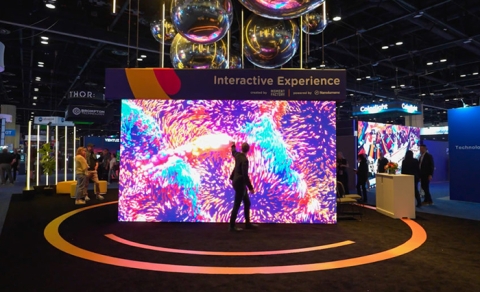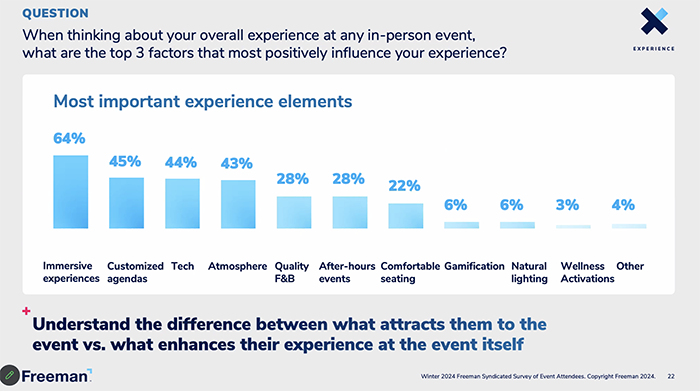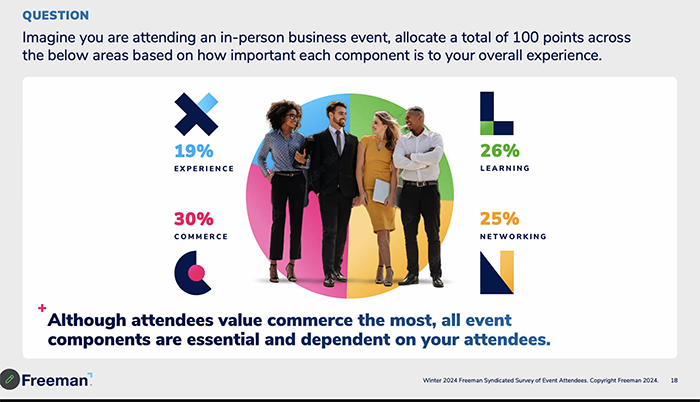What Attendees Want: 11 Takeaways for Event Organizers

What experiences do event attendees value most? During the Women in Exhibitions Network North America session, “New Audience Insights From Freeman,” on Feb. 16, Freeman Senior Vice President of Strategy Ken Holsinger provided a deeper dive into the 2024 Attendee Intent and Behavior, which garnered 3,200 respondents across a blend of events.
The one-hour online meeting covered the full report, but here are the top 11 things that attendees want from in-person events, according to the Freeman survey. When planning your event or exhibit and budgeting your spend, it’s helpful to know what attendees value most now.
The survey asked respondents: When thinking about your overall experience at any in-person event, what are the top three factors that most positively influence your experience?
- Immersive experiences (64%)
- Customized agendas (45%)
- Tech (44%)
- Atmosphere (43%)
- Quality F&B (28%)
- After-hours events (28%)
- Comfortable seating (22%)
- Gamification (6%)
- Natural lighting (6%)
- Wellness activations (3%)
- Other (4%)

“Understand the difference between what attracts attendees to the events versus what enhances their experience at the event itself,” Holsinger said.
For example, wellness activities like runs, yoga or meditation may not be the reason an attendee decides to come to the event, but it may increase their overall satisfaction.
Key components for business events

When asked: Imagine you are attending an in-person business event; allocate a total of 100 points across the below areas on how important each component is to your overall experience. The response:
- Commerce (30%)
- Learning (26%)
- Network (25%)
- Experience (19%)
“Although attendees value commerce the most, all event components are essential and dependent on your attendees,” Holsinger explained.
Food for thought
A few other highlights from the session:
- One tip for exhibitors: Staff your booth with more subject matter experts (SMEs) and less sales.
- Focus on what you can only do in-person.
- New products: Don’t wait until the show to announce new products. “It’s a miss,” Holsinger said. New products are a key motivator for attendees.
- Who is in charge of networking at your event? Networking is the No. 1 desire for next gen event-goers. Lean into the science and structure behind making networking a success vs. serendipity.
- Topic-specific meetups and roundtables are inexpensive and easy peer-to-peer networking opportunities.
- Close the gap: From the time an attendee registers online to badge pickup on-site, how are you customizing the experience for each segment or persona? Use data to determine the “why” behind their interest, and then recommend sessions, exhibitors, demos and more.
- Event attendees are consumers first. “Learn the unique traits of your audience, but focus on their consumer preferences first,” Holsinger suggested. “Some common traits and how they influence behavior (in order of importance): Generation, gender, socioeconomics, event type and industry.”
Holsinger first presented the data at PCMA’s Convening Leaders in January, and he’s scheduled to present the results at the SISO CEO Summit in April. The full SISO conference program is available here.
Don’t miss any event-related news: Sign up for our weekly e-newsletter HERE, listen to our latest podcast HERE and engage with us on LinkedIn!


Add new comment